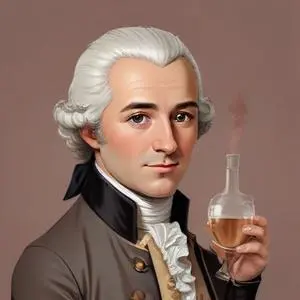
Father of modern chemistry, discovered oxygen, and developed a systematic method of chemical nomenclature. He laid the foundation for modern chemistry and paved the way for future scientific discoveries.
Antoine Lavoisier, a French nobleman and chemist, is renowned for his groundbreaking contributions to the field of chemistry, particularly his discovery of the role oxygen plays in combustion. He is credited with transforming the science of chemistry from a qualitative to a quantitative one, paving the way for significant advancements in the field.
Born on August 26, 1743, in Paris, France, Lavoisier came from a wealthy family of the nobility. He received his early education at the College Mazarin, where he developed a strong foundation in mathematics, physics, and chemistry. His academic excellence earned him a degree in law, but his true passion lay in scientific pursuits.
Lavoisier's most notable achievements include:
Lavoisier married Marie-Anne Paulze Lavoisier, who became not only his wife but also his laboratory assistant and a renowned chemist in her own right. Their partnership was a testament to the power of collaboration and mutual support in scientific pursuits.
In addition to his scientific endeavors, Lavoisier was a powerful member of various aristocratic councils and an administrator of the Ferme générale, a tax-collecting organization. These positions enabled him to fund his research and support his scientific work.
During the height of the French Revolution, Lavoisier was charged with tax fraud and selling adulterated tobacco. Despite appeals to spare his life in recognition of his contributions to science, he was guillotined on May 8, 1794. A year and a half later, the French government exonerated him of all wrongdoings, acknowledging the injustice of his execution.
Lavoisier's pioneering work had a profound impact on the development of chemistry and biology. His discoveries paved the way for significant advancements in various fields, including medicine, physics, and environmental science. He remains an inspiration to scientists and scholars around the world, a testament to the power of human ingenuity and dedication to the pursuit of knowledge.

Born in 1742
A pioneering pharmaceutical chemist who discovered oxygen, chlorine, and other elements, and made significant contributions to the field of chemistry.
Born in 1778
Pioneering chemist and physicist who discovered several elements, including potassium and sodium, and invented the Davy lamp, a safety lamp for miners. His groundbreaking work laid the foundation for modern chemistry and electrochemistry.
Born in 1749
Developed nebular hypothesis of the origin of the solar system and formulated Laplace's equation, a fundamental concept in mathematics and physics. He's considered the founder of celestial mechanics.
Born in 1728
Discovered magnesium and isolated carbon dioxide, making significant contributions to the field of chemistry.
Born in 1748
A French chemist and academic who pioneered the discovery of chlorine and developed a new theory of chemical reactions, revolutionizing the field of chemistry.